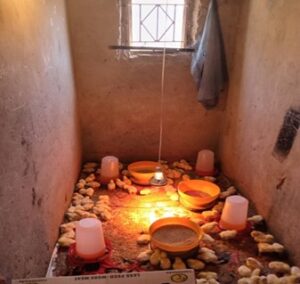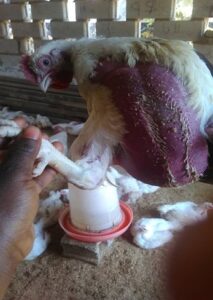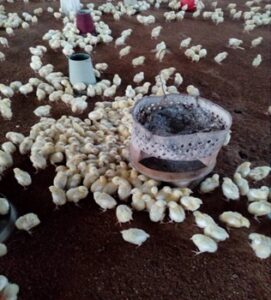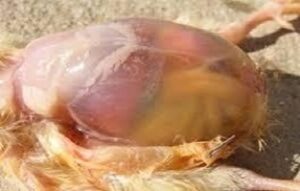Ascites, commonly known as ‘water belly’, is a condition that affects young, fast-growing broilers. Several agents may cause this condition but lack of oxygen or build-up of carbon monoxide and other waste gases in the brooder is the most prominent.
Exposure to poor quality air for extended periods during brooding will cause the heart valve to weaken and this in turn will result in back flow of blood and fluid into the body tissues. It is an important cause of broiler mortality at 5 to 7 weeks of age. Since mortality happens late in the production cycle, it translates into a great loss for the farmer.
- A poorly ventilated brooder can cause ascites.
- Reddish colouration of the skin and a distended abdomen are common signs of ascites in broilers.
Ascites is a non-contagious (not transmissible between birds) condition that may be influenced by genetics, nutrition, breeding, growth rate, ambient temperature, and oxygen content of the air. Symptoms of ascites include waterbelly, enlarged abdomen, reluctance to move, eat or drink, difficulty in breathing and reddish skin colouration. Affected birds are smaller than normal, and listless with ruffled feathers. Since this is not a disease caused by germs, it is not treatable with antibiotics. It is, however, a very preventable condition.
A farmer can escape its effects by providing a good balance between temperature and ventilation in the brooder. Allow adequate escape openings for waste gases to improve air quality within the pen and good areas where fresh air can find its way into the brooder without compromising on the temperature.
- Poor temperature management will cause chicks to huddle together, encouraging diseases.
- Fluid collection in abdominal cavity is a clear sign of ascites.
What to do
- Make provision for wide windows in the poultry house.
- Leave an opening of about 15 to 30 cm at the top of the window for gaseous exchange and improved ventilation.
- Never bring black brasiers into the brooder, first allow them to get red hot.
- Exercise good temperature management all through production but most importantly during brooding.
- Keep litter dry and loose to prevent a build-up of ammonia gas that may compromise air quality within the pen.
- Keep birds healthy as respiratory diseases can make the problem worse.
- Having some light-out periods during the night to reduce growth rate during the first two weeks of growth can reduce mortality due to ascites, flip-over syndrome, and leg problems.
- Feeding mash feed instead of pellets also helps to reduce growth and therefore reduces the problem.
For more information, please contact Barbara M Simbaya, Technical Advisor, Tiger Animal Feeds, at +26(0)96-920-2207 or barbara.mulonda@ tigerfeeds.com.zm.













